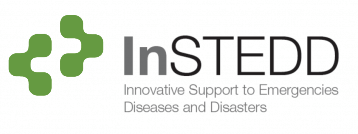Nonprofit InSTEDD Takes New Approach to Improving Global Health, Humanitarian Efforts, and Disaster Relief
New nonprofit to deliver innovative technologies and services to enhance collaboration; initial backing from Google.org, Rockefeller Foundation and private donors
PALO ALTO, Calif. – January 17, 2008 – InSTEDD (Innovative Support to Emergencies, Diseases and Disasters), a nonprofit organization focused on improving early detection, preparedness, and response capabilities for global health threats and humanitarian crises, was launched today. InSTEDD has received initial financial backing from Google.org, the Rockefeller Foundation and private donors.
InSTEDD (https://instedd.org) will work with the community of relief and response organizations, governments, academia and top scientists around the world to address gaps in information flow with software and other technology-based tools and services. Acting as an innovation laboratory, InSTEDD aims to support the humanitarian community in preparing for and responding to global public health emergencies, working together towards a safer world.
Google.org, the newly launched philanthropic arm of Google, created InSTEDD as one of its first projects within its Predict and Prevent Initiative, announced today, which has as its aim to identify “hotspots” of emerging threats and to enable a rapid response. “Our hope is that InSTEDD can serve as a broker for bringing multiple technology companies, including Google, together to contribute to the greatest needs in responding to global threats in an open, transparent and non-competitive space”, said Dr. Mark Smolinski, Director of the Predict and Prevent Initiative at Google.org. “In the case of infectious diseases, for example, the time has come to change our usual thinking from responding to threats only after they happen, to thinking about what we can do to prevent epidemics from occurring in the first place.”
InSTEDD’s first major international initiative is the Mekong Collaboration Program in Southeast Asia. InSTEDD staff, supported by a grant from the Rockefeller Foundation, will be working with more than 20 partners to enhance information flow, collaboration, and data visualization tools for emerging infectious disease preparedness. The work crosses governmental, geographical, and organizational boundaries in Vietnam, Thailand, Cambodia, Laos, Myanmar, and Yunnan Province in southern China.
“The efforts of humanitarian aid organizations around the world are often hobbled by technical and cross-cultural limitations,” said Dr. Eric Rasmussen, CEO of InSTEDD. “InSTEDD’s objective is to overcome these limitations with durable, scalable and affordable options that can be shared rapidly in even the worst environments.”
“We salute the launch of InSTEDD, which has great potential for advancing the groundbreaking work of the Mekong Basin Disease Surveillance Network,” said Judith Rodin, President of the Rockefeller Foundation, which funds the Network. “We’re delighted to join with Google.org in this crucial effort as we continue to work with a range of outstanding partners to develop global health initiatives that benefit poor and vulnerable people around the world.”
Another significant InSTEDD project is spearheading the Global Crisis Management (GCM) project with UNICEF, which is designed to improve UNICEF’s ability to assess and display worldwide crisis information within its Emergency Operations Centers in New York City and Geneva.
In its role as innovation laboratory, InSTEDD will investigate the challenges faced by humanitarian and public health organizations and develop technology solutions customized for their needs. InSTEDD’s software engineers will initially look for existing technology, practices and methods and examine ways they can be applied, adapted or transformed to address these challenges. If needed, InSTEDD’s staff will develop new technology to address a problem when no other acceptable option can be found. InSTEDD’s “Field Lab” has already built several tools and services that integrate technologies from Microsoft, Google, Facebook, and Twitter.
InSTEDD recognizes that the extreme environment of the humanitarian or public health worker demands technical designs that are stronger, faster, cheaper and more interoperable and mobile than many existing products and services currently available. InSTEDD’s knowledge and new technologies will be shared openly with the humanitarian community and modified as needed to address future challenges.
Background
InSTEDD was originally conceived as the result of a 2006 TED Conference Prize awarded to epidemiologist Dr. Larry Brilliant, who presently is Executive Director of Google.org and a member of the Board of Directors of InSTEDD.
Dr. Brilliant said, “History has shown that when we can identify, understand and address public health threats and disasters early, our ability to save lives is radically improved. My dream for InSTEDD is to fulfill the much-needed role of an independent agent bringing the technological, medical and organizational skills necessary to help the humanitarian aid community accomplish this, and ultimately help them to make the world a safer place.”
In May 2007, InSTEDD was incorporated as a 501(c)3 nonprofit. In October 2007, Eric Rasmussen, MD, MDM, FACP, became its CEO. Dr. Rasmussen is a former US Navy Commander with extensive experience in humanitarian efforts. He also is the chief architect of the “Strong Angel” international disaster response demonstrations.
The name InSTEDD began as a pun on “TED” (the TED conference) and “EDD” (Early Disease Detection). But the pun on the word “instead” led it to being adopted as the company’s name. InSTEDD is about new and better approaches—instead of doing things the way they’re done today.
About InSTEDD
InSTEDD (“Innovative Support to Emergencies, Diseases and Disaster”) is an independent, international 501(c)3 nonprofit corporation, chartered to develop improved information capabilities for global health security and disaster response. InSTEDD collaborates with partners dedicated to the health and safety of the global public. For additional information about InSTEDD, please visit the organization’s website athttp://InSTEDD.org.
More Information
info@instedd.org
www.instedd.org
